Britain’s only openly gay party leader Adam Price on Brexit, Boris Johnson and ‘bum boys’
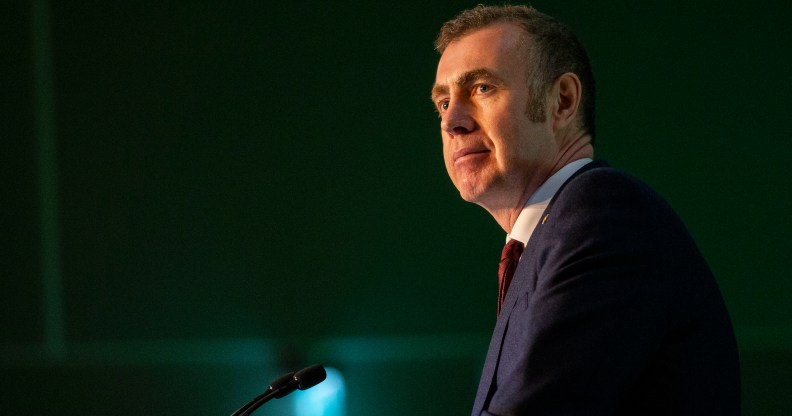
Plaid Cymru leader Adam Price launches his party’s general election manifesto at Coleg y Cymoedd in the Pontypridd constituency. (Mark Hawkins / Barcroft Media via Getty Images)
Adam Price is a huge fan of Dark Materials. He used to drink about a dozen cups of coffee per day before cutting it out (it was that or red wine, he said). He was just recommended to do his own line of audiobooks.
He’s also the first openly gay leader of a major UK political party.
Adam Price, the leader of the Welsh Plaid Cymru party, was tipped for years to become the party head before ascending in 2018.
He’s now vying for the top seat in Wales with a manifesto that sketches a nation given the chance for a second vote on withdrawing from the European Union – a topic that has violently splintered the UK – as well as bolstering LGBT-inclusive education.
Speaking to PinkNews, Adam Price presented his vision of a nation divorcing not just from the EU, but its own history as a progressive beacon.
One where the prospect of Conservative premier Boris Johnson forming a majority and enacting his Brexit project is, “not conducive” to the community, Price said.
And that the lawmaker’s consistent refusal to apologise for his use of homophobic slurs – notably “tank-topped bum boys” – is indicative of Johnsons lacking “a kind of basic empathy and sense of humanity.
“He’s like the school boy bully in a suit,” Adam Price added.
In a Q&A, the politician fiercely denounced Johnson’s refusal to apologise as well as chatting Brexit and how being gay has impacted his political career.
PinkNews: During the campaign trail, knocking door-to-door, did the topic of your sexuality ever come up with Welsh voters?
Adam Price: I don’t recall it coming up directly, but I do often have a lot of people who want to talk about their family members coming out.
It underlines how important being out is because you have to present a positive image: That it’s OK, you can be gay and successful and lead a fulfilling life; that it gets better.
It’s really heartening, and I’m very conscious thinking about my own 14, 15-year-old self grappling with these issues as there weren’t that many role models back in the day!
During your political career, when was the first time someone came out to you?
My first experience of gay men or women was really the Miner’s Strike.
People have seen the movie Pride and the London Gays and Lesbians Support the Miners, they came to my hometown [Carmarthen].
My father was a coal miner and my mother was very involved in the Women’s Support Group. That was that was such a massive experience for me because I knew already that I was gay and I used to see these aspects of my identity that I couldn’t bridge the gap between.
Being Welsh working class as I was, I was on one side and then being a gay man that was there on the other side. I just couldn’t see how these two could be interrelated.
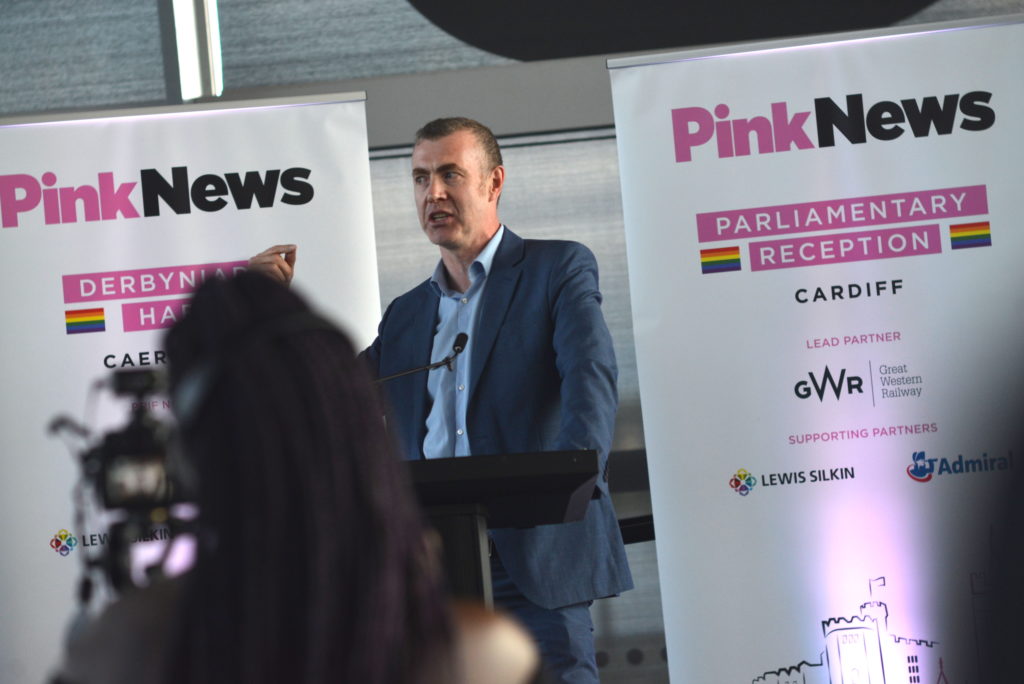
Adam Price spoke at the PinkNews summer reception in Cardiff. (PinkNews)
Just the very experience of seeing my community welcoming these really out of crowd gays and lesbians was such a touchstone moment.
I think, looking back, it sort of planted a seed in my mind that if I could bridge the two sides of my own identity, I would be welcomed by my community.
That they wouldn’t shun me, and it took me another 10 years to come out.
It was a slow burn, but I did get there eventually.
What was your first experience of homophobia like?
It was really tough in the 1980s.
The term, ‘bum boy’ – which has come to the fore recently – was something you would hear on a daily basis at school.
There was an almost obsessive quality to homophobia, and we probably all know why.
It was a constant backdrop for me really, and when you internalise this, all this negativity, this great sense of being found out, this super-self-consciousness.
I used to play rugby, and the self-censoring, physically, verbally, it was a huge strain on your mental and emotional health.
The sense of literally having to live a lie at a very young age.
I think we don’t emphasise enough the emotional and long-term impact that has on on us as gay people.
I was quite religious as a child, an evangelical Christian, and I was in a church that was very intolerant of homosexuality. It was a difficult thing.
Having to give up my faith – which had been quite important to me – was like choosing between my own happiness and the religion tradition I had joined.
Then Section 28 happened. Sex education lessons where the only reference that all was my teacher going: “Well, I hope none of you have turned out like that because you live desperate lives.”
That was the common experience for my generation.
I remember going on my first anti-Section 28 march in Cardiff around 1988. The looks of incredulity as we passed on people’s faces! It was a culture shock.
For me, it was probably one of my first steps in coming out.
In the march was one of my friends was there who was also gay. We went to the march together but neither of us had come out yet.
He then went home to his chapel, and the minister had seen a picture of us in the march.
At the end of the sermon as the minister shook everyone’s hands as they went off to Sunday lunch, he took him aside and said: “You do realise that that is not the way God created your backside.”
What is your earliest memory of a Pride you attended?
It was after I came out to my friends around 1992, I remember being on the train heading to Paddington [London] and we could all hear the whistles from about two miles away.
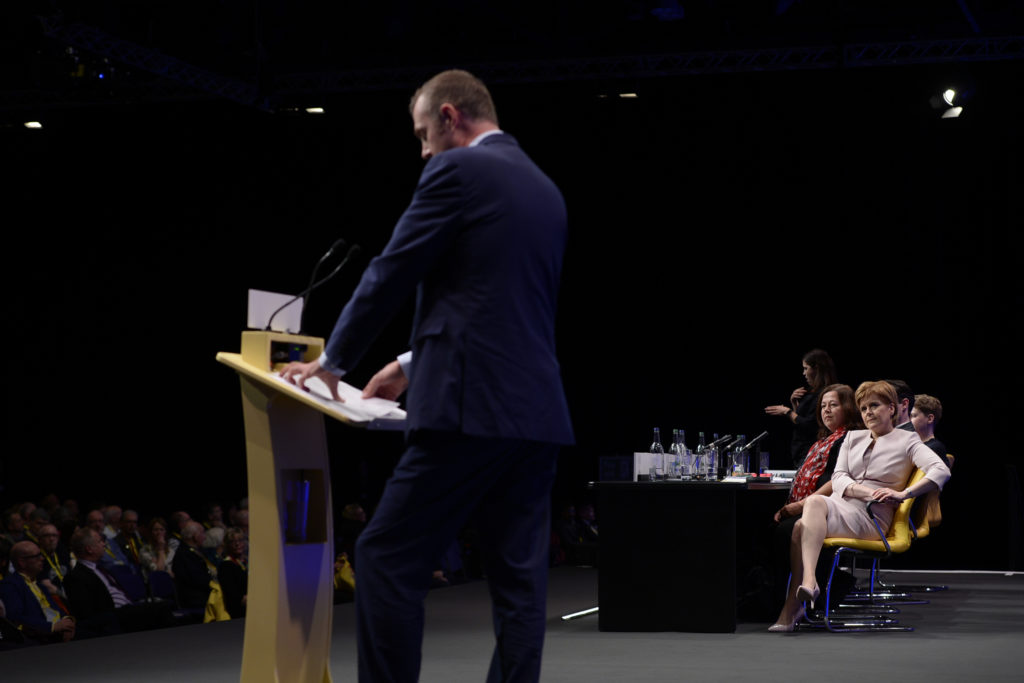
SNP leader and Scottish First Minister Nicola Sturgeon (R) listens as newly-elected Plaid Cymru leader Adam Price delivers the “Fraternal Address” to delegates on the second day of the party’s Annual National Conference at SECC on October 8, 2018. (Ken Jack – Corbis/Corbis via Getty Images)
It was just one of the most emotional experiences of my life because to see so many of us, you know, was the ultimate liberation and, and again, the power from that, and also just to be there: noisy, colourful, beautiful, unapologetic.
It was life-changing.
Who would you say your gay icon is?
Gareth Thomas. I think he’s done so much.
He’s quite frankly one of the greatest sporting heroes of all time. He changed the dynamic within Wales, within rugby, and then he did it all again in terms with coming out as living with HIV.
He’s a fantastic role model.
And who would you say is your trans icon?
I would have to say Jan Morris. One of Wales’ most prolific writers and showed incredible bravery for being so honest and accountable and to change attitudes.
We still have a long way to go.
Madonna or Cher?
Madonna. ‘Vogue’ is my favourite song!
I love that whole period and wish I could have gone to New York at the time.
You’re the first openly gay leaders of a majority party in the UK – whether positively or negatively, has your sexuality ever impacted your political career?
Yeah, it’s certainly impacted him because it’s such a it’s such a core part of who I am.
I’ve experienced very little homophobic abuse to my face. Obviously on social media these days, [homophobic abuse] is ubiquitous.
I was elected as an MP in 2001, and I was already out in every aspect of my life. But I hadn’t made a big public statement.
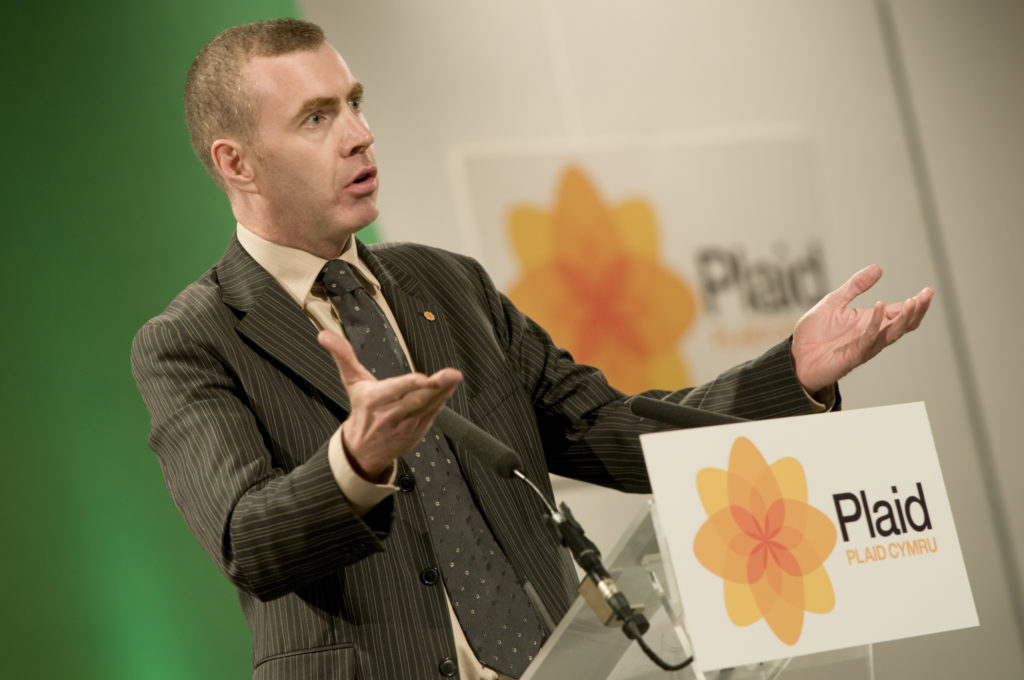
Adam Price MP addressing the party conference in Aberystwyth, september 12 2008. (Photofusion/Universal Images Group via Getty Images)
In the last weekend of the campaign, a newspaper was going to out me on the Tuesday before the election. It was a horrible experience.
The implication being that I’d somehow been dishonest about my sexuality, when it just simply hadn’t come up.
So I, one of the first things I did was was to organise an interview with the BBC, and just got it out there.
You know, I’ve never looked back since.
What are the biggest problems facing the LGBT+ community that the Plaid Cymru party aim to tackle?
I think homophobic bullying remains a huge problem and is true in Wales as it is in the rest of the UK.
We want to make sure that the curriculum is LGBTQ+ friendly and deliver positive messages and role models as part of relationship education.
In terms of the trans community, it’s very, very important in a time in which it’s very, very difficult, especially in the last three or four years […] that we move forward with the reform to the [Gender Recognition Act] to get rid of the bureaucratic process.
I think it’s so important to reiterate that trans women are women, trans men are men.
The attempt to vilify the trans community and, whether implicitly or explicitly, portray them as threats so we need to show absolute solidarity.
Will you be advocating for the ban of conversion therapy?
Absolutely! I mean, why haven’t we gotten rid of it already?
If a schoolchild was to call their gay classmate a “tank-topped bum boy”, what should their punishment be?
Well, I think we all know what we’re talking about here.
Sorry seems to be the hardest word to say, doesn’t it? And I think it’s quite simply.
I mean, he [Boris Johnson] really should apologise, because words matter.
That’s how you create this sort of climate that gives licence for people to be abusive, both verbally and physically.
And, of course, it wasn’t just it wasn’t just an isolated incident, wasn’t it? Because some of his other comments, such as his historical opposition to equal marriage by saying that it will mean three men and a dog could get married.
So, while he’s at it, he could apologise for that as well.
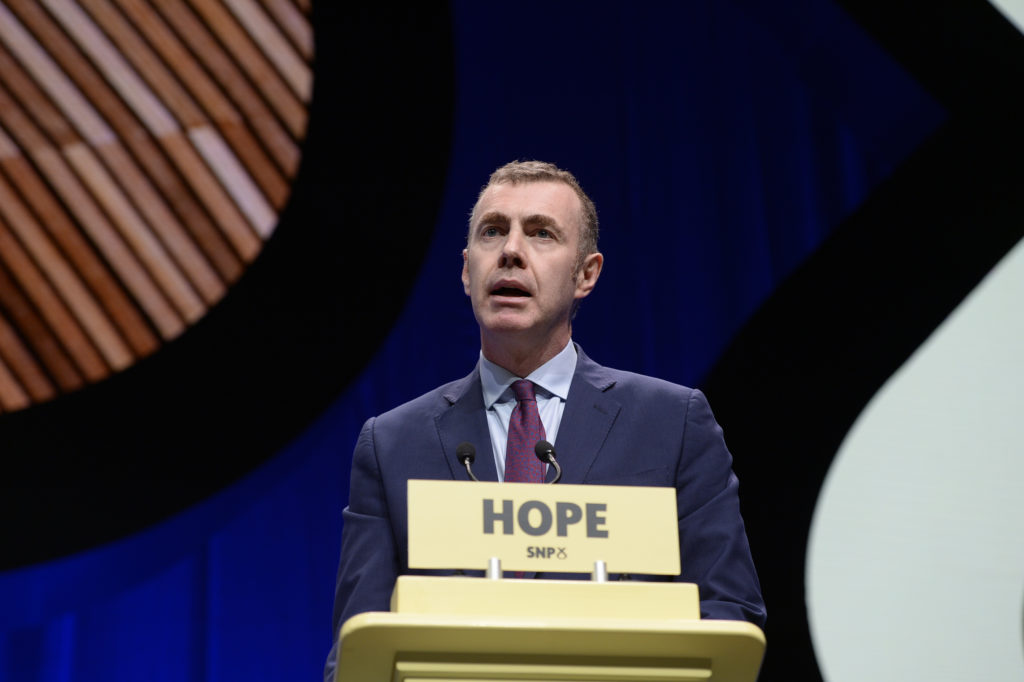
Adam Price. (Ken Jack – Corbis/Corbis via Getty Images)
It suggests someone who’s deeply immature and lacks a kind of basic empathy and sense of humanity. He’s like the school boy bully in a suit.
Unfortunately, his attitudes don’t seem to have changed all that much if he doesn’t realise the hurt that he’s caused by simply batting away these calls to apologise by saying, “Well, I’ve written 10 million words”, well, that’s not good enough.
Why didn’t you simply apologise?
Do you think that this might be an issue in cooperating with the Conservatives in the future?
The reality of it is, is that I have gay friends who are Conservatives, but I’m sure it will plant the seed of doubt in people.
The party did, in my mind, reinvent itself. It went through its post-nasty party phase and David Cameron even apologised to the gay community for its past mistakes.
But it feels as if know that, you know, one step forward two steps back because this feels more like the Conservative Party of old you know, pretty, increasingly hard right party, some fairly unsavoury views on immigration.
So, if you can have those kind of aggressive, kind of hateful, in my view, attitude to one set of minorities that actually opens up the space in which the other forms of prejudice can come to the fore.
The price of equality is eternal vigilance. But the prime minister doesn’t get it.
He was basically insensitive.
During these conversations about whether the prime minister was homophobic, some have noted an increase in the amount of homophobia they have encountered. Is this something you have personally felt?
I don’t want to talk too much about specifics, but there was one in my consistency.
But I think that the climate in the last three years has changed and it is now giving licence to people who previously would have kept their hateful and prejudicial views to themselves because they felt that society would be very judging of them.
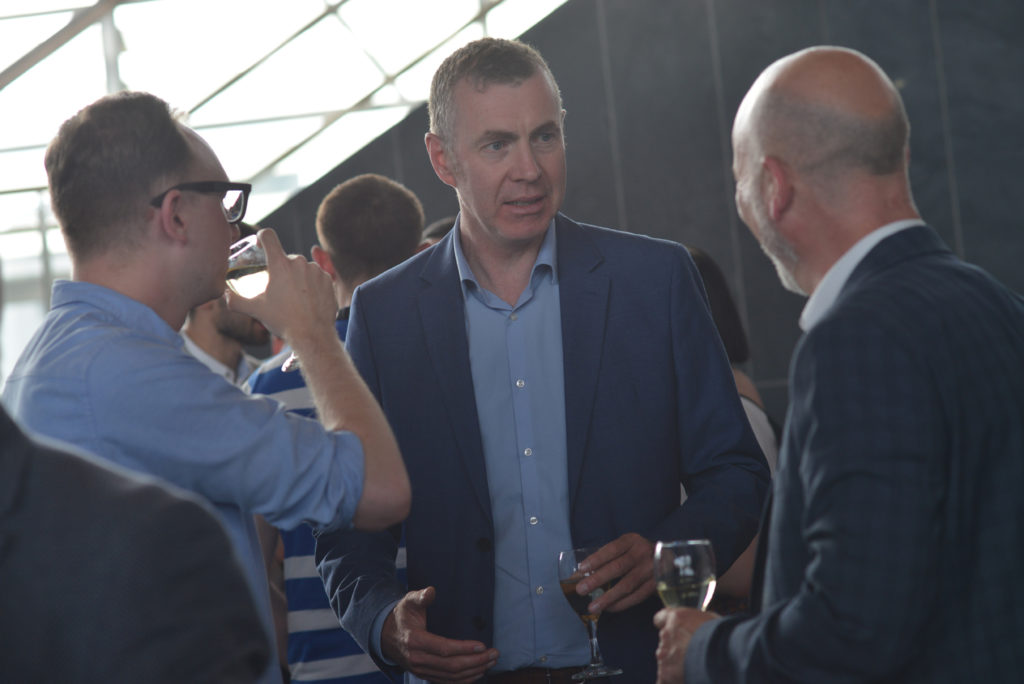
Adam Price said we must be in “total solidarity with our trans siblings” at the PinkNews summer reception in Cardiff. (PinkNews)
And now it’s okay to be racist, homophobic, transphobic again, so I think that has changed in the days following the referendum.
People, EU citizens for example, faced a torrent of daily abuse.
But there are also seeds of hope, isn’t there? Look at the resurgence of interest in progressive politics amongst young people.
Look at all the amazing women who have come through. Look at the prospect of Pete Buttigieg becoming president of the United States.
Why do you feel the LGBT+ community should advocate for a People’s Vote?
There are a number of economic arguments. We’re more likely to have higher wage jobs which, in our community, is very important.
Ultimately, ultimately, there’s no point having equality in terms of rights. If, you know, if you can’t afford to have a roof over your head.
I think that the broader question is about is about values. And so I think that left and right policies are one important axis in terms of politics, but I suppose open and closed maybe is another important axis.
So right around the world, whether it’s Trump in the US, or certainly some of the ideology which which surrounds itself around Brexit. Not to say everyone buys into that, but it’s certainly part of the critical project here.
It seems to be a very backward, very insular project. The kind of progressive values which have been at the heart of LGBT+ liberation sit more comfortably with the politics of internationalism and cooperation across borders.
I just don’t feel a ‘Boris Britain’ or a ‘Little England’ would not be necessarily a conducive environment for our community.
Why should LGBT+ people vote for Plaid Cymru?
I mean, I would love to be the first gay first minister in Wales.
But our vision is an exciting one, of a very progressive prosperous socially and economically just nation, which I hope can be a beacon of progress in all spheres, including in LGBT+ equality.
We want a different kind of politics to the one that unfortunately has been ruling the roost for far too long.

